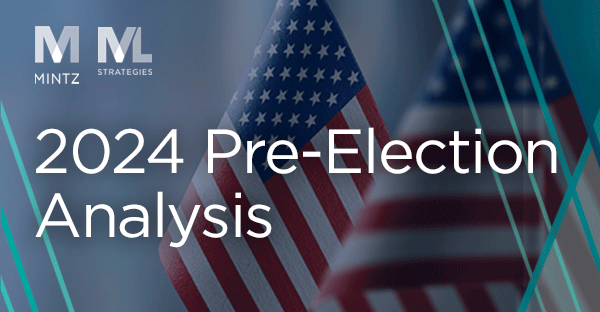Pre-Election Analysis: International Trade
As the 2024 US general election approaches, international trade has emerged as a pivotal issue, with presidential candidates Vice President Kamala Harris and former President Donald Trump navigating a complex web of global trade dynamics, from shifting supply chains and geopolitical tensions to emerging markets and trade agreements as they make their case for election. Engaged voters will be keenly aware that the approach taken by the winner of the presidential contest will have profound implications not only for the US economy but also for the nation’s standing in the global arena. In this installment of ML Strategies’ Pre-Election Analysis series, we will delve into how international trade is influencing the electoral debate, examining the presidential candidates' positions as well as the trade priorities of the two political parties on Capitol Hill as they vie for control of the US Senate and US House of Representatives in the 119th Congress.
Key international trade issues facing the next president and incoming congress will include managing ongoing trade tensions with other major economies like China, addressing vulnerabilities in the global supply chain, and negotiating new trade agreements or updating existing agreements such as the United States-Mexico-Canada Agreement (USMCA), which will be up for review in 2026. Other priorities will involve ensuring fair trade practices with regard to intellectual property and technology, integrating environmental sustainability and climate change mitigation efforts into trade policies, navigating trade relations amidst geopolitical conflicts, balancing trade policies to protect American workers and industries while promoting economic growth and international competitiveness, and ensuring that trading partners adhere to international trade rules.
For the entire Pre-Election Analysis series, visit our website to read previous guidance on Energy & Sustainability, US-Canada Cross-Border Issues, Tax, and Health Care, and check back regularly for future topics in the lead-up to the November 5 election.
International Trade Policy in a Harris Administration
As Kamala Harris continues to roll out her policy priorities, we can look to her past statements and policy positions as Vice President, US Senator, and previous presidential candidate to predict how she would tackle international trade if elected President.
The Vice President has expressed a desire to build strong alliances and collaborate with international partners. IAnd if elected, we may see her seek to resolve trade disputes through negotiation rather than escalating tariffs as Donald Trump has proposed. However, we note that the Biden-Harris administration left intact the previous president’s tariffs on imported Chinese goods, although the Democratic administration did make some targeted adjustments, such as modifying certain exemptions or extending some deadlines related to the tariffs.
Regarding global supply chains, the Vice President has often highlighted the importance of strengthening American manufacturing and supply chains. A Harris administration would focus on policies that encourage domestic production of critical goods while also diversifying supply chains to reduce US dependency on any single country. A key part of her strategy would be an investment in infrastructure and technology.
A Harris presidency would aim to modernize trade agreements, including updating the USMCA to tackle emerging economic challenges. As a US Senator, she was one of only ten to vote against the USMCA, criticizing it for inadequate environmental provisions and failure to address climate change. If elected, she would push for the 2026 USMCA review to enhance environmental standards and pursue new trade deals that emphasize labor rights, environmental protections, and fair-trade practices.
Protecting intellectual property, especially for technology and pharmaceutics, would be a key focus for a Harris administration which would likely advocate for stronger international agreements on IP protection while also supporting domestic innovation. She has raised concerns about global standards and regulations, trade agreements and digital trade, anti-competitive practices, data privacy and security, and trade policy and innovation.
The Vice President is a strong proponent of tackling the climate crisis and stresses the importance of climate action and sustainability in international relations. As president, she would incorporate environmental considerations into US trade policies, promoting green technologies, and urging other nations to commit to climate goals. Trade agreements under a Harris administration would emphasize environmental protections and carbon reduction.
Geopolitical conflicts, such as the war in Ukraine, are profoundly affecting US international trade by disrupting supply chains, influencing commodity prices, and reshaping geopolitical alliances. Drawing on her experience as Vice President, Harris would adopt a strategic approach to these tensions, focusing on diplomacy, coalition-building, and strategic partnerships to address conflicts, foster stability, and safeguard American interests in the global economy.
Balancing trade priorities to benefit American workers and industries would be a priority for a Harris administration, with initiatives to provide training and support for workers impacted by trade, and with investments in sectors that can drive domestic economic growth and job creation.
Finally, in keeping with the Biden-Harris administration’s record, Kamala Harris, if elected president, would advocate for robust enforcement of trade rules and seek to ensure that trade agreements are adhered to, emphasizing collaboration with international organizations to address violations and promotion of fair-trade practices.
International Trade Policy in a Second Trump Administration
If Donald Trump is reelected president, his second term would continue his “America first” approach to international trade, marked by unilateral actions, aggressive negotiation tactics, and a focus on reducing the trade deficit and protecting US industries. His policies would emphasize nationalism and protectionism, with less attention to multilateral cooperation and environmental issues.
During his previous term, Donald Trump used tariffs as a primary tool in trade negotiations. If reelected, he would continue this approach, especially with major trading partners like China. He might impose new tariffs or threaten them to leverage negotiations, focusing on achieving what he considers fair-trade deals and reducing trade deficits. As a presidential candidate in 2024, he has proposed a 10-percent tariff on all products imported into the United States. He has proposed a 60-percent tariff on all imports from China.
During his previous term and as a candidate in 2024, Trump has emphasized his support for reshoring manufacturing and reducing US dependency on foreign supply chains. If reelected, he could push for new policies to incentivize domestic production and reduce reliance on countries like China. This could include supporting initiatives for bringing critical industries back to the US and further restricting imports from certain countries.
The former president has consistently advocated for renegotiating trade agreements that he perceives as unfavorable to the US. This could involve reopening discussions on agreements like the USMCA or potentially revising or exiting other existing trade deals. His goal would be to secure terms that he believes will provide better protection for American industries and more advantageous conditions for US workers. A signature achievement of the previous Trump administration was the USMCA and, as noted above, the agreement will be up for review in two years. As a candidate in 2024, the former president has called for that review to occur before 2026.
Protecting US intellectual property would be a continued priority for a second Trump administration, particularly from theft or infringement from countries like China. If reelected he may pursue measures to safeguard American technological and pharmaceutical innovations, potentially using tariffs and sanctions as tools to enforce IP rights.
The former president is well known to be skeptical of climate change, and as president, he withdrew the US from the Paris Agreement on climate change. If reelected, he would continue to downplay climate-related considerations in US trade policy, instead focusing on economic benefits and energy independence. This would mean less emphasis on integrating environmental standards into trade agreements, a stark difference between him and Kamala Harris.
As previously discussed, ongoing geopolitical conflicts are profoundly affecting US international trade. In contrast to a potential Harris administration, a second Trump term would adopt a more confrontational stance. Trump would certainly employ a strong, unilateral approach to these conflicts, leveraging trade policy to address issues with nations like Russia or Iran. His administration would prioritize aggressive negotiations and sanctions to protect and advance US economic interests.
In line with his "America First" agenda, a second Trump administration would expand on his previous policies aimed at safeguarding and enhancing domestic industries, such as manufacturing and agriculture. This could involve implementing tax cuts, rolling back regulations, and providing subsidies to bolster these sectors. Additionally, Trump would focus on addressing what he perceives as unfair trade practices that disadvantage American workers. Central to his trade policy would be revitalizing American manufacturing, with a strong emphasis on boosting domestic production, reducing dependence on foreign goods, and supporting workers in the manufacturing sector.
And finally, a second Trump administration would take an aggressive stance toward enforcement of trade rules and holding trade partners accountable. This could be achieved using tariffs and other measures to ensure compliance with trade agreements and addressing perceived violations or unfair practices.
Democratic Leadership Priorities for International Trade Policy in the 119th Congress
If Democrats win the majority in the upcoming election, House Minority Leader Hakeem Jeffries (D-NY) is poised to become Speaker of the House in the 119thth Congress. Jeffries has consistently advocated for trade policies that ensure fairness and protect American workers. He has voiced concerns about China’s trade practices, including intellectual property theft and forced technology transfers, and supports measures to hold China accountable. Jeffries emphasizes the need for trade agreements that bolster US industries and prevent job losses due to trade imbalances. He also champions the inclusion of strong labor protections and environmental standards in trade deals.
Regardless of which party controls the House and Senate next year, Democratic leadership in the key international trade committees is expected to remain the same. Senator Ron Wyden (D-OR), current Chair of the Senate Finance Committee, champions fair-trade policies, criticizing trade agreements that he believes unfairly benefit other countries at the expense of American workers and businesses. He has been particularly vocal about China's trade practices, including intellectual property theft, forced technology transfers, and state subsidies, while advocating for trade policies that protect American workers and industries. In May 2024 the senator issued a statement in support of the Biden-Harris administration’s decision to increase tariffs on Chinese-made electric vehicles, batteries, and solar panels as part of a four-year review of Section 301 tariffs. Wyden supports modernizing trade agreements to address issues like digital trade and supply chain resilience. In August 2024, the senator introduced bipartisan legislation to help Customs and Border Protection (CBP) stop the flow of illicit goods, including fentanyl, counterfeits, and products made with forced labor, into the US by tightening import requirements for low-value packages. Similarly, Rep. Richard Neal (D-MA), Ranking Member of the House Ways & Means Committee, aligns with Wyden's concerns, emphasizing strong enforcement of trade rules and advocating for provisions in agreements like the USMCA that address labor rights, environmental standards, and trade imbalances. In April 2024, Neal applauded the Biden administration for initiating a Section 301 investigation into China’s unfair trade practices in the maritime industry, and he continues to emphasize the importance of creating a US national shipbuilding strategy. Both Wyden and Neal are committed to trade policies that promote fair competition, economic development, and job creation while mitigating adverse impacts on US workers and industries.
Republican Leadership Priorities for International Trade Policy in the 119th Congress
House Speaker Mike Johnson (R-LA) has articulated a clear stance on international trade, advocating for free trade principles that reduce barriers and promote open markets to foster economic growth and job creation. While supportive of free trade, he has expressed concerns about trade imbalances and the need for fair practices to ensure that US businesses are not disadvantaged. Johnson has also emphasized the need for a tough stance on China, addressing issues such as intellectual property theft and state subsidies to protect US economic interests. He has spoken about the importance of defending Taiwan from China to ensure a safe and secure semiconductor supply chain. Johnson also committed to extending the mandate of the bipartisan House Select Committee on the Chinese Communist Party into the next Congress. Johnson supports negotiating and implementing trade agreements that open new markets for US exports while safeguarding domestic industries and manufacturing. He promised to bring to the floor several bills focused on countering China, including the BIOSECURE Act, to halt federal contracts with biotech companies “connected to foreign adversaries” such as China, Russia, Iran, Cuba, and Venezuela.
As with the Democrats, no matter which party controls the majority in the House and Senate in the 119th Congress, Republican leadership of the committees overseeing international trade is expected to remain the same, with Senator Mike Crapo (R-ID) at the Senate Finance Committee and Representative Jason Smith (R-MO) at the House Ways & Means Committee. Both Crapo and Smith are strong advocates for free trade policies, promoting open markets and reducing barriers to enhance US economic growth and job creation. Crapo supports free trade while raising concerns about trade imbalances and advocating for measures to address the US trade deficit and ensure fair agreements for American industries. He is particularly focused on China’s trade practices, including intellectual property theft, and supports a firm stance to protect US economic interests. Crapo has stated that renewing the Generalized System of Preferences and the Miscellaneous Tariff Bill is a top priority. Representing a state with a significant agricultural sector, Crapo also emphasizes the importance of trade policies that benefit American farmers and enhance the competitiveness of US agricultural and energy exports. Similarly, Smith champions free trade and stresses the need for expanded market access to drive economic growth. He shares concerns about trade imbalances and advocates for fair trade practices while addressing unfair trade practices by China, such as intellectual property theft and forced technology transfers. He has also consistently called for stronger enforcement of the US-Mexico-Canada agreement. Like Senator Crapo, the congressman represents a district with strong agricultural and manufacturing sectors and supports policies that open new markets for US agricultural products, protect domestic manufacturing jobs, and ensure trade agreements align with US interests and contemporary issues like supply chain resilience. Smith has also indicated an intent to focus on critical minerals deals and countering Chinese influence in the Democratic Republic of Congo regarding critical minerals.
Opportunities for Bipartisan Collaboration
In the 119th Congress, there will be several areas for potential bipartisan cooperation on international trade, regardless of whether Kamala Harris or Donald Trump holds the presidency. This will be even more imperative should we have a divided government. Both parties can collaborate on strengthening supply chains to enhance domestic manufacturing and reduce reliance on foreign sources, particularly for critical industries. Reforming trade policies to address modern challenges, such as digital trade and environmental standards, presents another opportunity for cooperation. There is a shared concern about protecting intellectual property rights, which could lead to joint efforts to improve enforcement and international agreements. Supporting American agriculture through policies and trade agreements that open new markets and address trade imbalances could also gain bipartisan backing. Ensuring fair trade practices and improving trade enforcement mechanisms are common goals, as well as enhancing and expanding trade agreements like the USMCA. Additionally, supporting small and medium-sized enterprises (SMEs) and strengthening trade relationships with key allies are areas where both sides could find common ground. By focusing on these issues, Congress can advance US economic interests and foster a productive approach to international trade, regardless of who occupies the White House.
Closing Thoughts
As we consider the impact of the upcoming election on international trade policy, one certainty stands out: the decisions made by elected officials will significantly shape the nation's trade landscape for years to come. Whether the focus is on enhancing global trade agreements, addressing trade imbalances, or navigating geopolitical tensions, the implications are substantial. Engaging with and influencing these policies will be crucial.
ML Strategies is well-prepared to help interested stakeholders achieve their policy goals and is eager to discuss how we can support your efforts.

2024 Pre-Election Analysis
August 1, 2024| Blog|




